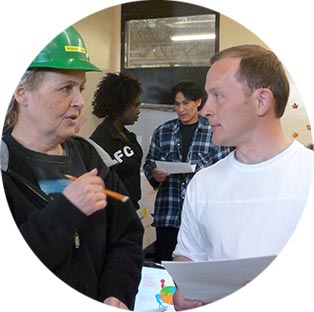The Webster dictionary defines talent as “a special ability that allows a person to do something well.” We all have some special abilities that help us do things well and we are actually full of latent, undeveloped talents
Why learn to see talent in others?
Dave Ulrich and Norm Smallwood wrote in their paper “What is talent?” that the ultimate test of leadership is how well leaders plan for succession or, in other words, how well do leaders internally build the next generation of leaders? At the C-suite level, Ulrich and Smallwood state that the ability to recognize talent requires systematic and candid reviews combined with the desire to groom others to their potential over time.
I assert that on every level of an organization, ability to recognize talent is key to survival, not just in the C-suite. Talent recognition involves mature leadership and the ability to see others as gifts rather than threats. It also requires the ability to continuously learn so that we increase our ability to see new talents and capacities in those around us. When considering people who have the ability to recognize talent in others, these people are those who tend to personally take advantage of coaching, seek insights from people outside of the company, participate in external groups, take targeted training, and continuously learn, listen, reflect and read.
Principle #1: If you yourself are not actively growing your talent bank, you are not likely to see talent in others.
The first piece of talent recognition then, is ongoing investment in your own learning and development. If you yourself are not actively growing your talent bank, you are not likely to see talent in others.
Why? Because most talent is hidden and it takes some detective sleuthing to find it. The process of developing your own potential fine-tunes your ability to pick up on that same development process in others and to recognize their gifts.
Principle #2: Talent blindness is a result of two human tendencies – awareness is the first step to overcoming them.
Generally, talent blindness is the result of two typical human tendencies:
- a) We tend to see others on our terms rather than theirs, and this leads us to look for people who are like us.
It’s the old adage, “Be careful who you choose as a recruiter – they’ll bring back copies of themselves.” What this saying points to is the fact that we are all naturally drawn toward people like us, and why wouldn’t we be? They are easy to understand, familiar, and comfortable. This can be problematic though when attempting to recognize talent in others. For example, if I’m a friendly extrovert, I may only see talent in other people who are friendly and extroverted and I may miss the good suggestions from people who keep to themselves because of this tendency.
- b) As managers, our focus on “getting the job done” creates a context where hidden talents can never show themselves.
And this is understandable: a large part of any manager’s performance is his or her ability to deliver measurable outcomes, BUT another important role mangers hold is to develop their people. Production processes and service delivery protocols may be so entrenched and emphasized that employees lack opportunity to innovate or act “outside the box.” For example, managers can’t discover that an employee has great mechanical intelligence if nothing has ever broken down and if the employee’s job has nothing to do with machine maintenance. It is only when something in the situation changes, such as the photocopier breaking down, that the manager has opportunity to see what else team members may have to offer.
The first tendency – our preference for people who are like us – autocorrects as we invest in our own learning and as we learn to seek out the opinions of others. When we learn more and develop better relationships with more diverse people, we come to see the asset that differences are. The second tendency to focus on results over people is more complex to deconstruct BUT I can guide you through it! The following strategies will help by defining various types of talent blindness, identifying key managerial take-aways, and highlighting personal talent-sleuthing goals to work toward accessing the full complement of abilities coworkers offer.
 Strategy #1: Overcoming contextual talent blindness
Strategy #1: Overcoming contextual talent blindness
1.Contextual Talent blindness
Context encourages some kinds of talent to express themselves but not others. This means that we don’t see talent because the context doesn’t encourage specific talents to be made visible.
For example if you are working with a coach as a basketball player, it is unlikely your coach and team will discover that you play the saxophone because the context of playing basketball is restricted to playing the game.
If you are a policeman it is unlikely your buddies will discover you are an avid bird watcher. Bird watching just doesn’t seem to fit the context of chasing bad guys or busting drug rings, does it?
You may ask, “Why does it matter that I know the hidden talents of my team members?” After all employees are paid to do their jobs, not watch birds or play the saxophone, unless of course those are their jobs… Well here’s the reason: knowing some of a team member’s talents from outside the work context helps you to connect team members to the job, to bond with the team and to find ways to apply what they already know from other contexts to their work.
Playing the saxophone requires listening, knowing certain styles of music and discipline to practice the instrument until you get good. It requires team work because most musicians like to play in groups – and they learn to listen to each other and work from each others’ cues. All these things can be applied to the workplace: openness to learning, good listening, discipline, knowing a body of facts and knowledge about a subject, team work and picking up on other people’s cues.
Now for the bird watching…consider the competencies developed here: paying attention to detail, learning to identify commonalities and differences in species, appreciation of diversity, perseverance to track and find, and data collection. Could you use some of these skills in your team?
The manager takeaway to overcome contextual talent blindness is:
Get to know people’s interests and hobbies in order to find hidden talents. Help them to connect their skills from those interests to the job. Share your knowledge of people’s interests with the rest of the team to help the team connect, bond and be more responsive to each other.
 Strategy #2: Overcoming “same old” talent blindness
Strategy #2: Overcoming “same old” talent blindness
- “Same old, same old” talent blindness
In short, this blindness stems from the fact that we don’t know what people can do differently because they are always doing the same job.
Here’s an example: a woman who was working as a lead hand in a meat processing plant had to have surgery on her knee and couldn’t do the usual lead hand work for three months while healing. When her boss asked what he was supposed to do with her when she came back to work, she offered to rewrite and design all the line manuals not only for her line but for the other lines as well. She also offered to design online forms for the company.
Her boss was surprised because he had no idea she could do that kind of work, and he asked her for a sample. When he saw how skilled she was, he decided to hire her to redo all the company documents and to put all their forms online. I asked her why she had never spoken to her boss about these skills before and she said it was because “He probably wouldn’t believe me. He doesn’t know who I am really.” She had to have surgery and have her boss ask, “What am I going to do with you?” before he was open to hearing about her skill in another area. I believe she now works as a scheduler at that company – her organizational skill and document creation talents are finally being utilized – and all it took were eight years with the company and one knee operation.
The manager takeaway to over come same old, same old talent blindness is:
Don’t be like that manager who had to wait until his employee was incapacitated before finding out what she could really do! Assign different jobs to people to find out who does what well.

Strategy #3: Overcoming “I could do this in my sleep” talent blindness
- “I could do this in my sleep” talent blindness
People develop latent talents when a challenge forces them to. Have you heard the saying, “Necessity is the mother of invention?” It means that when you must do something you have to get creative to solve the problem. Ask any survivor of an accident or natural disaster about this and it is pretty amazing what people are able to come up with to survive when all the normal channels for food, water and shelter are not available.
On a less dramatic scale, if you have ever tried cross-fit training or prepared for a race or competition you will know that you have to push yourself beyond your limits to reach fitness or performance goals – and then you find you can do even more than you thought. What seemed impossible a month or two ago after challenging yourself, suddenly seems easy.
Your employees need challenges too. There is a tendency for many companies to always be asking, “What should I give, provide, offer to my employees next?” This just promotes an attitude of entitlement and a passive “but I don’t know what to do” reaction to upcoming work issues. To engage people fully they need to be challenged, to be told they have to work harder, give more, find better solutions and stand and deliver in the face of obstacles. This develops the attitude that employees should be constantly thinking about how they can give to the team, the job, the mission, the company – and in the process develop some new talents they didn’t know they had. If you have been spoiling your team instead of challenging them be prepared for a backlash when you start introducing challenge back into the picture. But that doesn’t mean you shouldn’t do it – after all, that is your challenge to overcome!
The manager takeaway to overcome “I could do this in my sleep” talent blindness is:
Challenge your team regularly! Challenge yourself too – and get your team to come up with challenges that you also have to participate in. Challenge is the way to develop latent talents.

Strategy #4: Overcoming “fear of looking bad in front of the team” talent blindness
- “Fear of looking bad in front of the team” talent blindness:
Another way to see hidden talent is to tell the team about a manager or business problem you are having that has either baffled you or requires some new skill you aren’t sure you have. Ask who has some knowledge, experience or skill that could help. You will be amazed at how many hidden skills were lying just under your nose.
I know an amazing story about a CEO of a multi-national company who asked his team to help him figure out how to deal with a habit of procrastinating on certain decisions. The short version of the story is that his upper management team all admitted that they were procrastinating on the same things, and it became a company project to find out why everyone was avoiding these same issues. When they drilled down, the problem was costing them huge customer satisfaction because they could only deliver on time and on budget 13% of the time!
You have to admit it takes a lot of humility and courage for a CEO to tell his upper management team that he has problems with procrastination. The CEO had to allow himself to be vulnerable to discover the hidden talents of his team and to solve a company problem that ended up being not his alone, but everyone’s problem.
Once I was organizing an event for which I had eight task groups. As the event drew closer, one of the key people who was tasked with finding antique artifacts from a certain period and culture, accepted a job in another country and I was left with no one to do this critical task for the event. I called a quick meeting with three of the task force groups and told them I had no idea what to do. Within literally minutes, they had all figured out people and places where they could find the necessary artifacts and had found everything we needed and more in less than 24 hours! I discovered that there was internal networking that I had no idea existed between various cultural groups, stores and dealers. From that moment on, I made it a point of sharing my business frustrations with my team to find solutions I could never have found alone. I also started looking for volunteers to do small jobs I was frustrated with to see what I could learn from them. This resulted in two new positions being created in my company.
The manager takeaway to overcome “fear of looking bad in front of the team” talent blindness is:
Share some of the problems and obstacles in your path with your team and ask for their help. Allowing yourself not to know something and to learn from the team is a powerful way to discover their talents, not to mention a great lesson in how to solve problems by using the wisdom of the group.
Closing thoughts

“Every successful individual knows that his or her achievement depends a community of persons working together”
The first step to overcoming talent blindness is to actively develop your own talent bank. Identify where you need to grow, plan how you are going to get there, see who you can pull in to help you, and then begin.
Next, pay more attention to the people around you. Get curious – ask questions that aren’t work related, give your team members a choice to accept a new task or to take on a new project, talk about the difficulties you are having with projects and create challenges for each other. Ultimately, let your coworkers know that you want them to develop and succeed and that you are doing your best to facilitate that opportunity for them and walk your talk.
Here I can confidently offer two guarantees: the first is that you will learn much about yourself if you follow through with this process, and the second is that you’ll enable others to learn so much more about themselves as well. So start now. Certainly an increase in personal and interpersonal knowledge is a strong step forward on the path toward success?
Want to learn more about effective management? Click below to claim your spot in our FREE Quickstudy Learning Module: Manage Up
References:
Ulrich, Dave & Ross, Stephen M. What is talent? RBL Group Executive White Paper Series: https://michiganross.umich.edu/sites/default/files/uploads/RTIA/pdfs/dulrich_wp_what_is_talent.pdf
“Got an eye for “talent”? Better check that bias blind spot”
http://www.joegerstandt.com/2014/07/got-eye-talent-better-check-bias-blind-spot/
5 ways to recognize and utilize talent: https://web.archive.org/web/20171020040838/https://www.workhappynow.com/2011/05/5-ways-to-recognize-and-utilize-talent/

“The ultimate test of leadership is how well leaders build the next generation of leaders”






 Strategy #1: Overcoming contextual talent blindness
Strategy #1: Overcoming contextual talent blindness Strategy #2: Overcoming “same old” talent blindness
Strategy #2: Overcoming “same old” talent blindness

